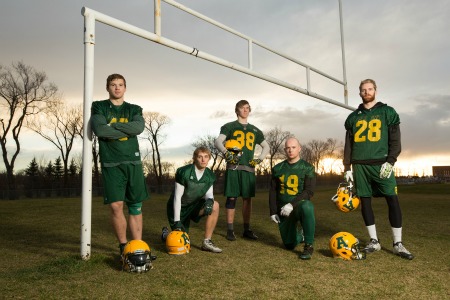
Samson Abbott, Cole Christianson, Luke Sperry, Steven McCaffery and Kael Schryver are among the 13 engineering students on the UAlberta Golden Bears football team. Photo Amber Bracken.
(Edmonton) It's no secret that the University of Alberta offers a high-end, challenging engineering program. But it does come as a surprise to some people that every year, more than 40 engineering students make the cut and also play on varsity sports teams.
Final rosters for the 2015-16 season are not all established yet, but the level of involvement shows no signs of waning. Seven members of the Bears' soccer team are engineering students and 13 members of the football team are in the Faculty of Engineering.
One of those students, Kael Schryver, was among 14 engineering students (out of 142 U of A student athletes) named Academic All Canadians in 2014, in recognition of their excellence in academics and sports.
A passion for your sport, and above-average time management skills are the keys to success, Schryver says.
The mechanical engineering student earned a 3.5 grade point average last year-his first year on the Golden Bears. For the previous five years, the Salisbury Composite High School graduate played junior football with the Edmonton Wildcats.
Schryver began his postsecondary studies at MacEwan University.
"I didn't know what I wanted to do right out of high school," he said. "I chose engineering because I liked and tended to do better at those science type classes out of MacEwan, so it was a natural transition."
Part of his time management strategy is to take a reduced course load, enrolling in four courses during the fall and five in the winter semester.
"We have more free time in the winter semester, so this makes things more manageable," said Schryver.
The team itself takes the academic success of its athletes seriously. First-year engineering students are allowed to practice but not play with the team, because academics take priority.
In recent years, under the leadership of coach Chris Morris, the team began providing a tutoring service for engineering students after players asked for academic support.
Samuel Rybiak, who is now in his third year of engineering (studying environmental engineering), says that early in his studies, he felt it would be impossible to complete a math assignment and meet his obligations to the team when. He and a fellow engineering student on the team approached Morris and asked for help finding a tutor.
The next day, Rybiak recalls, the team had secured a dedicated tutor for the engineering students. Study time is built into all players' training schedules.
Rybiak also takes a reduced course load, and is clearly enjoying his studies. Last summer he worked in environmental engineering professor Ania Ulrich's lab, working on ways to clean oil sands processed water. He hopes to apply his engineering education in environmental remediation.
He says being part of a varsity team helps students learn skills not directly taught in the classroom-like teamwork and communication skills.
Steve McCaffery, who graduated with a degree in petroleum engineering this spring, enrolled in three courses this fall so he could end his football career on a high note. In 2013, he was out with a serious injury that required two knee surgeries-preventing him from playing in 2014.
"It's my love of the game that brought me back," he said. "After all the rehab and training to get back to full health, I told myself I couldn't end my career on an injury. I decided to come back and play this year.
"In order to be an eligible student athlete you must be enrolled in three classes, so I'm currently taking a couple computer science courses along with a political science course."
The student athletes say there are similarities between football and engineering. On one hand both require focus, concentration, and strong individual efforts-they also demand study and preparation and, importantly, teamwork.
McCaffery says he has used his involvement in sports as part of his job interviews.
"Playing sports has helped me in the job search as well with previous summer jobs I've had. Playing a varsity sport has a serious level of commitment and not just a time commitment. Time management is definitely essential in balancing both of these, between weekly assignments, studying for tests, and daily practice it teaches you to prioritize," he said.
"There's a strong amount of accountability that is required. Football specifically is a very team-oriented sport that requires a large amount of co-ordination where every person has to do their individual job in order for the group to succeed. I have found this is very relevant and transferable into the workplace and my experience with football has allowed me to connect with employers."